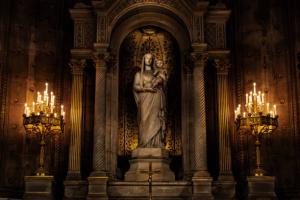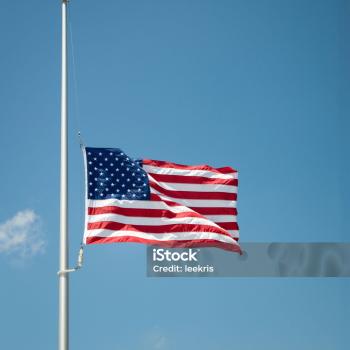
The recently concluded synod on synodality could have gone in a lot of different directions—a nothingburger, a schism, or anything in between. To this Catholic at least, the possibility that the synodal process would end in a substantive report that is not symbolically beholden to the politics of the moment—liberal or conservative—seemed like too much to hope for.
Political Ideology
The modern Church in the West, like Western society more generally, seems ever more polarized along lines that have less to do with religious belief than with political identity. Indeed, Pope Francis is often perceived (mostly unfairly) by both the liberal media and its conservative antagonists within and outside the Church as a progressive first and a pope second. Meanwhile, the Catholic Church writ large is often perceived by mainstream secularists as regressive and backwards, mostly due to its doctrinal positions on matters of sexual morality.
But the Church, properly understood, has no ideology. Any positions it appears to take on political matters are in fact best interpreted as understandings of spiritual matters that have been politicized.
For example, to advocate against abortion, as the Church does, is not “conservative.” It is to stand for the sanctity of human life, which sits on a higher plane than politics. Meanwhile, to work toward the alleviation of poverty, as the Church also does, is not “progressive.” It is to stand for the dignity of human life, which also transcends political considerations. To any Catholic with even a passing acquaintance with the faith, neither of these statements is controversial.
Where Catholics often seem to get almost unavoidably bogged down in politics is on issues related to sexual orientation and so-called gender identity. Some of the faithful see the welcome and inclusion of people with varying sexual orientations and gender identities as inextricable from the love of Christ. Others see the unequivocal recognition of male and female, and the sacramental union of the two, as inextricable from God’s truth, without which there can be no real love.
That these two perspectives (and many in between, like mine) would come together at the synod on synodality and emerge with a document that manages to give adequate voice to both “unconditional acceptance” and “magisterium on marriage and sexual ethics” appeared unlikely. But much to many self-identified progressive Catholics’ disappointment—and even more to the credit of Pope Francis and the progressive Catholics who attended the synod—that is exactly what they did.
Progressive Catholics’ Finest Hour
In the West, there is a growing interpretation of the Church’s sexual ethics as outdated, regressive, and exclusive. The working document for the synod reflected this concern, expressly noting the needs of “LGBTQ” Catholics.
The final report of the synod, however, refers only to “matters of identity and sexuality,” which is a step “backwards” from the point of view of those aligned with Jesuit priest and LGBTQ Catholic advocate Father James Martin, who attended the synod. When the final report was made public, Martin expressed disappointment “not only that the LGBTQ were excised but also that the discussions we had, which were passionate on both sides, were not reflected in the final document.”
Given Martin’s correct belief that the Catholic faith demands equal dignity for all and his defensible perspective that the Church does not currently treat those identifying as LGBTQ with sufficient dignity, his disappointment—and that of others who share his view—is understandable.
But, in fact, this very document in which progressive Catholics profess disappointment is a profound tribute to their own good faith in practicing the inclusivity that they preach.
Although well-known American conservatives, like Cardinal Timothy Dolan, certainly aided in the effort to excise the inherently political, sub-religious language of identity (like “LGBTQ”) from the synod’s final report, the primary opposition to categorizing people in accordance with progressive political monikers came from priests, bishops, and lay Catholics in the global South.
In Africa, where the Church is growing rapidly (unlike in the West, where it is losing adherents), support for the Church’s teachings on sexual morality—that is, that homosexuality is “intrinsically disordered” and that all sexual activity outside of a sacramental marriage, which necessarily includes all homosexual activity, is a sin—is near-ubiquitous. Not only for doctrinal reasons, but also for exactly the kinds of cultural considerations to which progressives favor being sensitive. As Martin himself explains, for some Catholics in the global South, the very term “LGBTQ” is received as an unwelcome, neo-colonial imposition.
That the LGBTQ Catholic cause held so dear by many Western progressive Catholics was ultimately subordinated to the process of the synod—in which everyone’s opinions were heard, and every part of the final report required two-thirds approval from the participants—merits great hope because it reflects good faith on the part of Pope Francis and his mostly progressive acolytes.
At the synod, true inclusivity took precedence over the faux-inclusivity that we so often see in progressive circles, in which the ostensibly marginalized are sycophantically tokenized when they tow the party line—and excluded when they don’t.
This may not have been the synod report that progressive Catholics wanted, but it is to their credit one upon which the global Church can move forward none the worse–and perhaps even somewhat the better–for this synodal process.
Like many Catholics, I have often been embarrassed and angered by the overt sexism (benevolent and otherwise) that women experience within the Church due in large measure to its clericalism. So, to see unexpectedly insightful lines like this out of the synod report is cause for renewed faith in those entrusted with the future of the faith itself:
- “Pastoral accompaniment and vigorous advocacy for women should go hand in hand.”
- Women are not “an issue or a problem.”
- Women and men should be “in dialogue together…as protagonists, without subordination, exclusion, and competition.”
- We must excise “clericalism, a chauvinist mentality, and inappropriate expressions of authority” vis-à-vis women.
Pope Francis entrusted the process of the synod to the Holy Spirit. Apparently, this last month in Rome, He was working overtime on multiple fronts.












